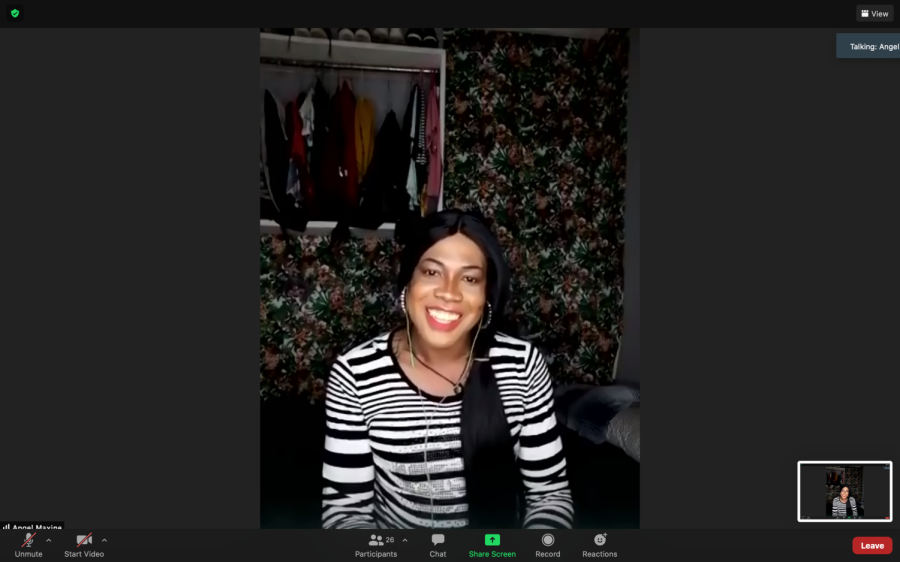Ghanaian musician Angel Maxine discusses musical activism, LGBTQ+ advocacy
Angel Maxine at a “Let’s Talk Africa” lecture series event last Thursday.
February 14, 2022
Despite the rising threat of anti-LGBTQ+ legislation in Ghana, Angel Maxine, known as Ghana’s first transgender musician, is remaining defiant and using her music as a form of activism.
“This is meant to cause a distraction to humanity and to innocent people,” Maxine said. “That’s why we are still fighting.”
Maxine released the song “Kill the Bill” in November 2021 as a response to a bill considered in Ghana’s Parliament that would criminalize homosexuality, and put the LGBTQ+ community and those who advocate for them in danger. The title references the Kill the Bill, or Stop the Bill movement in Ghana which opposes the legislation.
Maxine discussed the issue last Thursday over Zoom in the “Let’s Talk Africa” lecture series, sponsored by the Center for African Studies and the Gender, Sexuality and Women’s Studies program. Pitt students and faculty, as well as attendees from around the world, joined to hear Maxine talk about her experiences and struggles as a queer person in Ghana and how she uses her music to stand up for queer rights.
Melissa Tabak, an administrative assistant at the Center for African Studies, organized the event after a student brought Maxine and her work to her attention. “Let’s Talk Africa” lectures happen at least once a semester, according to Tabak, and cover a variety of topics and issues related to Africa.
“One of our students came to us and brought Maxine to our attention, and he suggested that she’d make a really good speaker,” Tabak said. “We are always trying to show different perspectives of Africa.”
Maxine said her love for music began when she was young. She grew up in a Christian home and joined her church’s choir. She later realized that she could write songs by herself. As her music career took off, she said she began to explore her identity and how she wanted to present herself to the world.
“It’s not an easy journey, especially living in Ghana,” Maxine said.
According to Maxine, Ghanaians who identify as queer are not easily accepted in their community. She said she didn’t get much help or support from the people around her. This prompted her to start learning more about herself, and who she wanted to be. She said she wanted to be a musician that embraced her true self and represented her community.
“I wanted to be visible. I wanted to be in the entertainment sector. I’m not going to hide under the umbrella of being somebody else. I have to be me. I have to come out as myself. And make people know that this is it and this is how it’s gonna be,” Maxine said. “I am a woman and take me as I am. So I made that strong decision for myself.”
Maxine also spoke about the impact that she hoped to make with her two Afropop songs, “Wo Fie” and “Kill the Bill.” Music was not only an outlet to express herself, but also a way to bring awareness to issues that she cared about.
“I feel like these two songs are enough to speak to the community. It sends strong messages,” Maxine said. “It’s how my music has been and how I’ve combatted this bill and homophobia through my music. I try to be as much as possible consistent in what I do. I want them to know that we are there. And that we will be there forever and even if we die tomorrow, another LGBT [person] will be born.”
Lisa Brush, the sociology department’s chair, attended the event to learn more about LGBTQ+ rights in Ghana and how Maxine uses her music as an outlet to enact change.
“I thought it was really interesting to have the opportunity to learn about the way that cultural activism is playing a role in both Maxine’s personal growth and in organizing the Stop the Bill movement in Ghana,” Brush said.
Brush also asked various questions during a Q&A about the religious influence on homophobic and transphobic legislation in Ghana, and how messages that Maxine conveys in her music can gain attention from religious organizations.
“One of the questions that I asked was about ways that we could contact religious organizations that might be influential in Ghana to amplify Maxine’s message in music,” Brush explained. “And other ways that people who aren’t in Ghana could be signaling support that would be amplifying Maxine’s message, and especially contributing to the effort to Stop the Bill.”
Brush said she found it inspiring how Maxine encouraged individuals around the world not only to learn about the anti-LGBTQ+ agenda in Ghana, but to take part in Ghanaian movements that advocate for queer rights. This includes supporting artists like Maxine and sharing her music to a broader audience.
“It sounded to me as though Maxine wasn’t very hopeful about changing the minds of the religious organizations that seem to be inputting support for the legislation and that wasn’t going to be a particularly useful route,” Brush said. “So that was interesting to learn about Maxine’s diagnosis for the situation there, and what people outside of Ghana could be doing to make change.”
Tabak said one of the biggest challenges is the anti-LGBTQ+ bill, which not only criminalizes being LGBTQ+, but also supporting the community. This could threaten queer individuals with long prison terms.
“It’s a pretty extreme bill,” Tabak explained. “It would make people’s lives so much harder, like Angel’s.”
Despite the challenges the Ghanaian queer community faces, Tabak said Maxine represents hope.
“I hope people took a lot of hope away from it. I know that it’s sad and challenging what people are dealing with there but it gives, at least me, a lot of hope knowing that there is somebody like her and the community fighting for people who are so vulnerable,” Tabak said.



